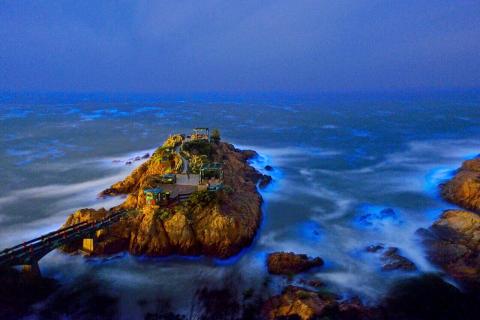Work on a heart-shaped stone structure on Beigang Island in Matsu has been halted after residents raised environmental concerns.
The structure is meant to promote “blue tears” — also known as the blue tide — luminescence visible at night in the sea that occurs from April to August.
Scientists disagree over whether it is glowing ostracods or flagellates that cause the blue light.

Photo courtesy of the Lienchiang County Government
The blue tide attracts tourists to the Lienchiang County islands, prompting the county government to make “Blue Tear” tourism an important agenda to boost the archipelago’s economy.
Beigang Township (北竿) Mayor Chen Ju-lan (陳如嵐) said the stone pile his office is building on the beach by Houao Village (后澳) was inspired by a similar structure on Penghu’s Cimei Island, a double-heart-shaped pile made to trap fish and crabs, which has become a tourist attraction.
However, Houao resident Chen Tzu-kai (陳紫開), a teacher at Jhongshan High School, said on Facebook that the half-finished structure could become a garbage trap, with debris from China washed into the seas by typhoons collecting in it, while it might not be sturdy enough to withstand the high waves common in winter.
Over the past week, Chen Tzu-kai’s post has attracted the attention of locals and netizens, with news channels running reports critical of the structure.
Residents said that pollution has affected the sea near Houao that was once rich with crabs and other shellfish, and they fear construction in the area would irrevocably damage the environment.
Chen Ju-lan said the township had made plans to remove the stone pile if it was unsuccessful for any reason, and the stones would be recycled to build embankments for local roads with a minimum of waste to public coffers.
Houao has a tradition of building stone piles for fishing and the township office on Dec. 29 last year held a public hearing regarding its plans, he said, adding that residents who participated in the hearing largely supported the plan.
The structure is unlikely to create any pollution, because it is made of natural stones, he said, adding that the township office is to be responsible for its maintenance.
The opposition of some Beigang residents to the project was the result of a “communication failure” on the part of the township office and more public hearings are to be held to clarify the issue, he said.
The 30m structure is to cost the township an estimated NT$1 million (US$31,368), Chen Ju-lan said.
Beigang Township Council Chairman Chiu Pao-te (邱德寶) called on the township office to re-evaluate the the project, saying: “We should not cause any negative effects to the environment or damage the island’s public image.”

Alain Robert, known as the "French Spider-Man," praised Alex Honnold as exceptionally well-prepared after the US climber completed a free solo ascent of Taipei 101 yesterday. Robert said Honnold's ascent of the 508m-tall skyscraper in just more than one-and-a-half hours without using safety ropes or equipment was a remarkable achievement. "This is my life," he said in an interview conducted in French, adding that he liked the feeling of being "on the edge of danger." The 63-year-old Frenchman climbed Taipei 101 using ropes in December 2004, taking about four hours to reach the top. On a one-to-10 scale of difficulty, Robert said Taipei 101

A preclearance service to facilitate entry for people traveling to select airports in Japan would be available from Thursday next week to Feb. 25 at Taiwan Taoyuan International Airport, Taoyuan International Airport Corp (TIAC) said on Tuesday. The service was first made available to Taiwanese travelers throughout the winter vacation of 2024 and during the Lunar New Year holiday. In addition to flights to the Japanese cities of Hakodate, Asahikawa, Akita, Sendai, Niigata, Okayama, Takamatsu, Kumamoto and Kagoshima, the service would be available to travelers to Kobe and Oita. The service can be accessed by passengers of 15 flight routes operated by

Taiwanese and US defense groups are collaborating to introduce deployable, semi-autonomous manufacturing systems for drones and components in a boost to the nation’s supply chain resilience. Taiwan’s G-Tech Optroelectronics Corp subsidiary GTOC and the US’ Aerkomm Inc on Friday announced an agreement with fellow US-based Firestorm Lab to adopt the latter’s xCell, a technology featuring 3D printers fitted in 6.1m container units. The systems enable aerial platforms and parts to be produced in high volumes from dispersed nodes capable of rapid redeployment, to minimize the risk of enemy strikes and to meet field requirements, they said. Firestorm chief technology officer Ian Muceus said

MORE FALL: An investigation into one of Xi’s key cronies, part of a broader ‘anti-corruption’ drive, indicates that he might have a deep distrust in the military, an expert said China’s latest military purge underscores systemic risks in its shift from collective leadership to sole rule under Chinese President Xi Jinping (習近平), and could disrupt its chain of command and military capabilities, a national security official said yesterday. If decisionmaking within the Chinese Communist Party has become “irrational” under one-man rule, the Taiwan Strait and the regional situation must be approached with extreme caution, given unforeseen risks, they added. The anonymous official made the remarks as China’s Central Military Commission Vice Chairman Zhang Youxia (張又俠) and Joint Staff Department Chief of Staff Liu Zhenli (劉振立) were reportedly being investigated for suspected “serious